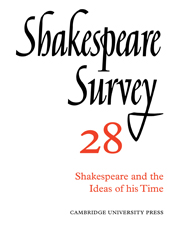Book contents
- Frontmatter
- ‘Richard II’ and the Realities of Power
- The Politics of Corruption in Shakespeare’s England
- Literature without Philosophy: ‘Antony and Cleopatra’
- Self-consciousness in Montaigne and Shakespeare
- ‘Measure for Measure’: The Bed-trick
- Shakespeare and the Doctrine of the Unity of Time
- ‘Coriolanus’ and the Body Politic
- ‘Titus Andronicus’, iii, i, 298–9
- ‘The Merchant of Venice’ and the Pattern of Romantic Comedy
- The Integrity of ‘Measure for Measure’
- ‘To Say One’: An Essay on ‘Hamlet’
- ‘The Tempest’ and King James’s ‘Daemonologie’
- Sight-lines in a Conjectural Reconstruction of an Elizabethan Playhouse
- The Smallest Season: The Royal Shakespeare Company at Stratford in 1974
- The Year's Contributions to Shakespearian Study 1 Critical Studies
- 2 Shakespeare’s Life, Times, and Stage
- 3 Textual Studies
- Index
- Plate section
Shakespeare and the Doctrine of the Unity of Time
Published online by Cambridge University Press: 28 March 2007
- Frontmatter
- ‘Richard II’ and the Realities of Power
- The Politics of Corruption in Shakespeare’s England
- Literature without Philosophy: ‘Antony and Cleopatra’
- Self-consciousness in Montaigne and Shakespeare
- ‘Measure for Measure’: The Bed-trick
- Shakespeare and the Doctrine of the Unity of Time
- ‘Coriolanus’ and the Body Politic
- ‘Titus Andronicus’, iii, i, 298–9
- ‘The Merchant of Venice’ and the Pattern of Romantic Comedy
- The Integrity of ‘Measure for Measure’
- ‘To Say One’: An Essay on ‘Hamlet’
- ‘The Tempest’ and King James’s ‘Daemonologie’
- Sight-lines in a Conjectural Reconstruction of an Elizabethan Playhouse
- The Smallest Season: The Royal Shakespeare Company at Stratford in 1974
- The Year's Contributions to Shakespearian Study 1 Critical Studies
- 2 Shakespeare’s Life, Times, and Stage
- 3 Textual Studies
- Index
- Plate section
Summary
Anyone who sets out to discover Shakespeare’s attitudes towards the ideas of his time, his thoughts and feelings about them, must soon come to realize that he is pursuing a will-o’-the-wisp, which will leave him ‘swallowed up and lost, from succour far’. ‘Others abide our question. Thou art free . . .’ But there is one idea of his time where Shakespeare, I believe, for once abides our question; where, when we ask and ask, he smiles, yet is not still, outtopping knowledge, but, on the contrary, allows us some very palpable and consistent glimpses of his feelings about it. That idea is the doctrine of the unity of time.
This doctrine, buttressed by the supposed authority of Aristotle, was grounded on the critics' desire for the utmost verisimilitude, for making the least possible demands on the audience's powers of imagination. The ideal play was therefore held to be the one in which the time of its action is co-extensive with the time taken by its performance. But it was generally agreed that up to twelve or even twenty-four hours could be conceded, provided the extra hours fell in the intervals between the acts.
First formulated in Italy towards the middle of the sixteenth century as one of the rules of drama, the doctrine of the unity of time assumed the status of an inviolable law after Castelvetro, in his commentary on Aristotle's Poetics, first published in 1570, had joined it with the unities of place and action, which were a logical inference from it. It began its tyrannical reign, first in Italy and then in France, in the last quarter of the sixteenth century.
- Type
- Chapter
- Information
- Shakespeare Survey , pp. 57 - 62Publisher: Cambridge University PressPrint publication year: 1975
- 2
- Cited by

